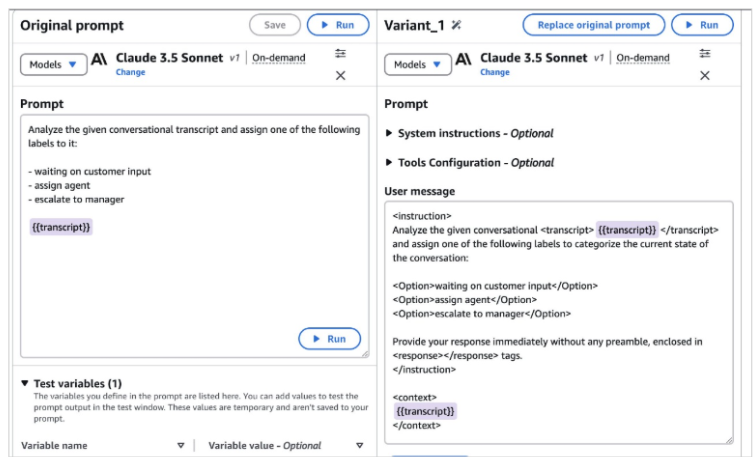Amazon’s newly launched Bedrock AI service’s automatic word prompt optimization function is profoundly changing the landscape of artificial intelligence application development. This feature is designed to significantly improve AI task performance at the lowest cost and bring significant efficiency improvements to developers. With a single API call or simple click operation, developers can optimize the prompt words of multiple leading AI models, including Anthropic's Claude3, Meta's Llama3, Mistral Large, and Amazon's own Titan Text Premier. This technology has achieved significant improvements in text summarization, dialogue continuity based on retrieval-augmented generation (RAG), and function calling capabilities, saving developers a lot of time and effort.
Amazon is revolutionizing the game in AI application development. By launching the automatic word prompt optimization function for the Bedrock AI service, the technology giant promises to significantly improve the performance of AI tasks with minimal user cost.
This innovative tool allows developers to easily optimize prompt words for multiple AI models with a single API call or the click of a button in the Amazon Bedrock console. Currently, the system supports a variety of leading AI models including Anthropic’s Claude3, Meta’s Llama3, Mistral Large and Amazon’s own Titan Text Premier.

The test results on open source datasets are impressive. Amazon announced that this optimization tool has achieved significant improvements in different AI tasks:
Text summary task performance increased by 18%
Dialogue continuity improved by 8% based on Retrieval Augmented Generation (RAG)
Function calling ability increased by 22%
Practical application scenarios for this feature include classification of chat records or call logs. The system can automatically refine the original prompt words to make them more precise and simplify the process of adding and testing variables.
What does this mean for developers? The tedious process that used to take months of manual prompt word engineering is now expected to be significantly shortened. Developers can more quickly find optimal prompt words for different models and tasks.
However, Amazon admits that this tool is not a panacea. Industry experts point out that automatic optimization systems still have limitations when dealing with complex multi-example prompt words. Although it can help add structure and detail, human professional judgment is still irreplaceable in understanding task requirements and designing effective cue words.
It’s worth noting that Amazon is not alone. Anthropic and OpenAI have also developed similar prompt word optimization tools. But it’s not entirely clear how these systems evaluate improvements and how much they rely on the quality of the initial prompts.
From a broader perspective, this feature reflects the major transformation the AI industry is undergoing. As AI models become more and more complex, the emergence of optimization tools is lowering the technical entry barrier, allowing more developers to efficiently utilize advanced AI technology.
For companies and developers who are developing AI, this innovation from Amazon is undoubtedly worth paying close attention to. It may mark a new, more intelligent stage for prompt word engineering.
Despite its limitations, Amazon's automatic word prompt optimization function is undoubtedly a major advancement in the field of artificial intelligence. It will significantly improve development efficiency and promote the wider application of AI technology. In the future, as the technology continues to mature, this tool is expected to be further improved to provide developers with stronger support.